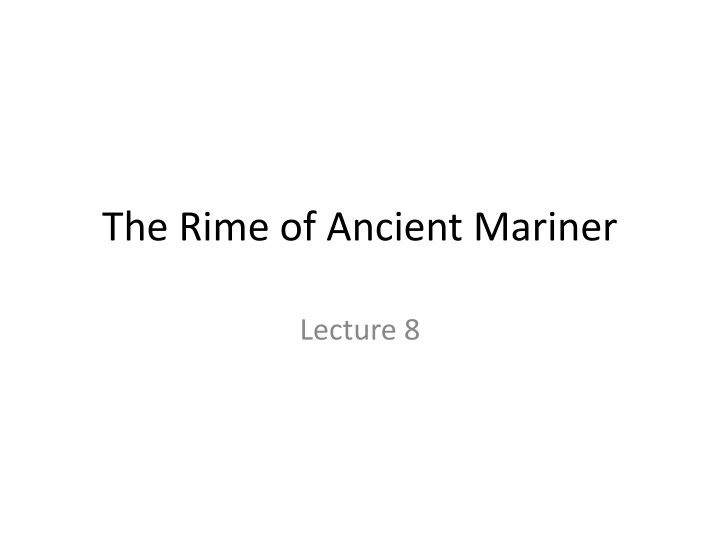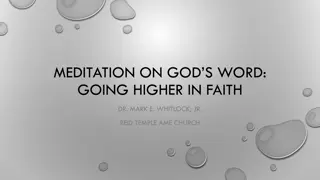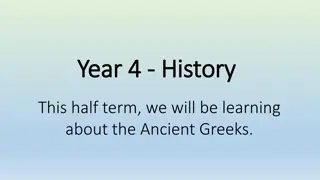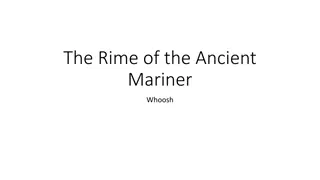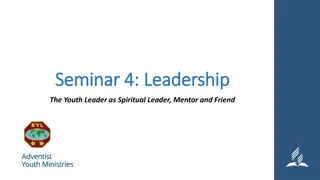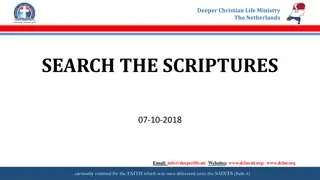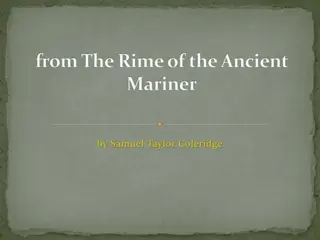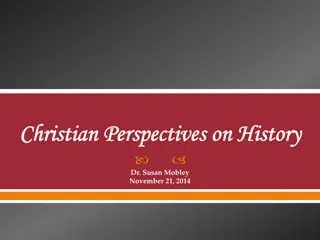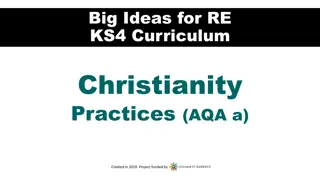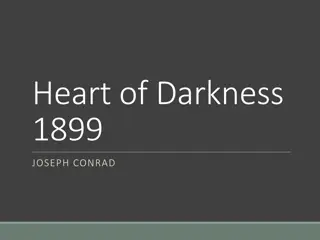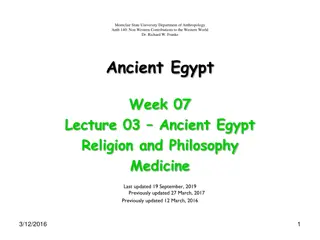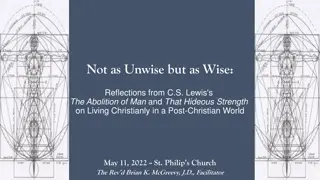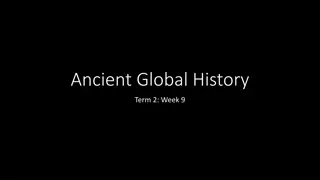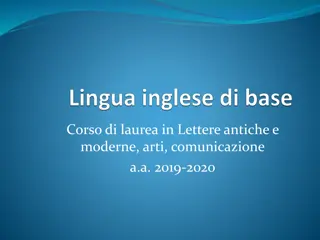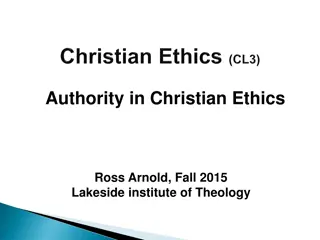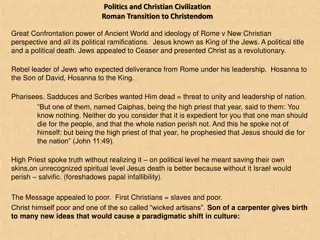Analysis of Christian Themes in "The Rime of Ancient Mariner
The poem "The Rime of Ancient Mariner" explores Christian themes of sin, baptism, and redemption through the journey of the mariner. As the mariner faces the consequences of his actions, he undergoes a transformation, finding solace and redemption in his connection with nature and God's creatures. The mariner's curse is eventually lifted through prayer, illustrating the power of repentance and forgiveness. The poem delves into the complexities of moral dilemmas, human nature, and the significance of spiritual awakening.
Download Presentation

Please find below an Image/Link to download the presentation.
The content on the website is provided AS IS for your information and personal use only. It may not be sold, licensed, or shared on other websites without obtaining consent from the author.If you encounter any issues during the download, it is possible that the publisher has removed the file from their server.
You are allowed to download the files provided on this website for personal or commercial use, subject to the condition that they are used lawfully. All files are the property of their respective owners.
The content on the website is provided AS IS for your information and personal use only. It may not be sold, licensed, or shared on other websites without obtaining consent from the author.
E N D
Presentation Transcript
The Rime of Ancient Mariner Lecture 8
Natural world becomes more threatening: it becomes hot, pungent and rotten. His surroundings are rotting in the sun but he is rotten from inside he has become a living death . His moral draught is lifted and he is able to bless & love God s creatures. Mariner s curse is lifted as a result of a prayer. Christian themes of sin, baptism and redemption.
Part 4 'I fear thee, ancient Mariner! I fear thy skinny hand! And thou art long, and lank, and brown, As is the ribbed sea-sand.
I fear thee and thy glittering eye, And thy skinny hand, so brown.' Fear not, fear not, thou Wedding-Guest! This body dropt not down. His soul longing to be free the living death.
Alone, alone, all, all alone, Alone on a wide wide sea! And never a saint took pity on My soul in agony. His punishment.
The many men, so beautiful! And they all dead did lie: And a thousand thousand slimy things Lived on; and so did I. Still not respecting Nature and God s creatures.
I looked upon the rotting sea, And drew my eyes away; I looked upon the rotting deck, And there the dead men lay.
I looked to heaven and tried to pray But or ever a prayer had gusht My heart as dry as dust. He cannot pray; instead a curse comes to his lips.
I closed my lids, and kept them close, And the balls like pulses beat; For the sky and the sea, and the sea and the sky Lay dead like a load on my weary eye, And the dead were at my feet. He fails to repent, cant even sleep; he is made to lie awake eternally.
The cold sweat melted from their limbs, Nor rot nor reek did they: The look with which they looked on me Had never passed away. As a punishment their bodies stay to remind him of his sin.
An orphan's curse would drag to hell A spirit from on high; But oh! more horrible than that Is the curse in a dead man's eye! Seven days, seven nights, I saw that curse, And yet I could not die. An orphan s curse can even drag an angel to hell.
The moving Moon went up the sky, And no where did abide: Softly she was going up, And a star or two beside Lies awake at night.
Her beams bemocked the sultry main, Like April hoar-frost spread; But where the ship's huge shadow lay, The charm d water burnt alway A still and awful red. Compares the moonlight to frost, that falls on ship like frost in April calmness and serenity descend upon him.
Beyond the shadow of the ship, I watched the water-snakes: They moved in tracks of shining white, And when they reared, the elfish light Fell off in hoary flakes.
Within the shadow of the ship I watched their rich attire: Blue, glossy green, and velvet black, They coiled and swam; and every track Was a flash of golden fire.
O happy living things! no tongue Their beauty might declare: A spring of love gushed from my heart, And I bless d them unaware: Sure my kind saint took pity on me, And I blessed them unaware. Compares his own plight with them.
The self-same moment I could pray; And from my neck so free The Albatross fell off, and sank Like lead into the sea. The burden of sins is lifted.
Part 5 Oh sleep! it is a gentle thing, Beloved from pole to pole! To Mary Queen the praise be given! She sent the gentle sleep from Heaven, That slid into my soul.
The silly buckets on the deck, That had so long remained, I dreamt that they were filled with dew; And when I awoke, it rained.
My lips were wet, my throat was cold, My garments all were dank; Sure I had drunken in my dreams, And still my body drank.
I moved, and could not feel my limbs: I was so light almost I thought that I had died in sleep, And was a blessed ghost.
And soon I heard a roaring wind: It did not come anear; But with its sound it shook the sails, That were so thin and sere.
The upper air burst into life! And a hundred fire-flags sheen, To and fro they were hurried about! And to and fro, and in and out, The wan stars danced between.
And the coming wind did roar more loud, And the sails did sigh like sedge, And the rain poured down from one black cloud; The Moon was at its edge.
The thick black cloud was cleft, and still The Moon was at its side: Like waters shot from some high crag, The lightning fell with never a jag, A river steep and wide.
The loud wind never reached the ship, Yet now the ship moved on! Beneath the lightning and the Moon The dead men gave a groan.
They groaned, they stirred, they all uprose, Nor spake, nor moved their eyes; It had been strange, even in a dream, To have seen those dead men rise.
The helmsman steered, the ship moved on; Yet never a breeze up-blew; The mariners all 'gan work the ropes, Where they were wont to do; They raised their limbs like lifeless tools We were a ghastly crew.
The body of my brother's son Stood by me, knee to knee: The body and I pulled at one rope, But he said nought to me.
'I fear thee, ancient Mariner!' Be calm, thou Wedding-Guest! 'Twas not those souls that fled in pain, Which to their corses came again, But a troop of spirits blest:
For when it dawnedthey dropped their arms, And clustered round the mast; Sweet sounds rose slowly through their mouths, And from their bodies passed.
Around, around, flew each sweet sound, Then darted to the Sun; Slowly the sounds came back again, Now mixed, now one by one.
Sometimes a-dropping from the sky I heard the sky-lark sing; Sometimes all little birds that are, How they seemed to fill the sea and air With their sweet jargoning!
And now 'twas like all instruments, Now like a lonely flute; And now it is an angel's song, That makes the heavens be mute.
It ceased; yet still the sails made on A pleasant noise till noon, A noise like of a hidden brook In the leafy month of June, That to the sleeping woods all night Singeth a quiet tune.
Till noon we quietly sailed on, Yet never a breeze did breathe: Slowly and smoothly went the ship, Moved onward from beneath.
Under the keel nine fathom deep, From the land of mist and snow, The spirit slid: and it was he That made the ship to go. The sails at noon left off their tune, And the ship stood still also.
The Sun, right up above the mast, Had fixed her to the ocean: But in a minute she 'gan stir, With a short uneasy motion Backwards and forwards half her length With a short uneasy motion.
Then like a pawing horse let go, She made a sudden bound: It flung the blood into my head, And I fell down in a swound.
How long in that same fit I lay, I have not to declare; But ere my living life returned, I heard and in my soul discerned Two voices in the air.
'Is it he?' quoth one, 'Is this the man? By him who died on cross, With his cruel bow he laid full low The harmless Albatross.
The spirit who bideth by himself In the land of mist and snow, He loved the bird that loved the man Who shot him with his bow.'
The other was a softer voice, As soft as honey-dew: Quoth he, 'The man hath penance done, And penance more will do.'
